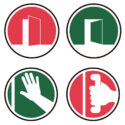
Jodie Mears shares her journey from stagnation to success, highlighting the importance of personal branding and strategic networking in transforming your administrative career
Your personal brand is your reputation. And your reputation in perpetuity is the foundation of your career.
Gary Vaynerchuk
Our role is changing, that’s a fact – but have you thought about what steps to take now to start changing personally alongside the professional and technological changes that are required for us to stay relevant and highly skilled?
Pre-pandemic, I felt stagnant as an administrative Assistant, believing I had plateaued. In hindsight, it was a mindset of blissful ignorance, denying the need to go above and beyond my current efforts to fulfil my potential. With excellent performance reviews and positive feedback, I felt safe in my bubble and stayed there for a while.
I occasionally noticed courses, networks, and speakers offering various personal and professional development opportunities during this time. However, I now realise I wasn’t ready to take advantage of those opportunities. I hadn’t yet understood that I was the one holding myself back. Believing I was untouchable in my role based on positive reviews and promises turned out to be the biggest mistake of my career.
Once I had my moment of realisation, I began asking questions and started networking out of curiosity. This led to a domino effect of uncovering information that fuelled my desire to learn and do more. Since then, I have been sharing my knowledge and how I implemented it in a relatable way for Assistants worldwide.
While listening to excerpts from The World Economic Forum’s Future of Jobs Report 2023 during a learning and development conference, I learned that “Administrative and Executive Secretaries” were among the top 10 fastest declining jobs. This was alarming at first. However, it also highlighted that skills like analytical thinking, creativity, leadership, and technology will be in high demand. These are skills we already have or can develop. If you are an optimist like me, you will see this as an opportunity to showcase and leverage these valuable skills.
So, how can ambitious Assistants like us take the next leap forward and position ourselves for coveted strategic and leadership roles? The answer, which I have implemented for myself, is leveraging the power of personal branding and strategic networking.
Personal Branding
When asked why I believe personal branding is essential for career advancement even though many Assistants have progressed without it being so visible and public in the past, I explain that your personal brand is a unique blend of your skills, experiences, and personality. It’s crucial to voice and make this known, as it sets you apart from the masses and defines how you’re perceived, including by potential employers. In today’s digitally and socially connected world, it is easy for employers to meet and hire Assistants globally. This is why I believe now is the time for personal branding – no one will know you’re the best if you’re hiding.
Your personal brand is essentially your reputation on a larger scale, encompassing both your online and offline presence. It’s who you are at your core. As the administrative profession undergoes significant changes, your reputation will play a crucial role in shaping your career path.
Do you feel that personal branding is showing off and find it a bit awkward? I used to feel that way too, but I changed my perspective. Now, building my brand feels effortless because I remember: it’s not about ‘look at me,’ but rather ‘look at what I can do for you.’
What will this do for you? In short, it will help you stand out in a crowded market, establish credibility and trust, and provide social proof of your skills. You’ll see results once you adopt a mindset of being intentional, driven, and consistent.
This approach starts with identifying your unique value proposition. Just as businesses use a value proposition to market their products and services, you can use one to market yourself.
Value proposition
A value proposition is a crucial part of your personal brand strategy because it:
- Defines and communicates your unique skills and value
- Differentiates you from others
- Persuades businesses to choose you over others for a new role or to lead a project
A strong value proposition answers three key questions:
- What problem do you solve?
- How do you solve it better than anyone else?
- Why should the business care?
To create a value proposition that complements your personal brand, follow these four steps:
- Identify the main pain points of the organisation or executives.
- Explain how your unique skills and characteristics address these issues and deliver value.
- Highlight what sets you apart and your skills.
- Test and refine your value proposition until it is clear, concise, and compelling.
By developing skills that align with the World Economic Forum’s predictions and consistently highlighting your expertise through your personal brand and value proposition, you will undoubtedly jumpstart a shift in your career.
However, let’s not forget the importance of networking. While having a strong online presence and valuable content is crucial, the power of in-person connections should not be underestimated. This approach has been effective for me, even as a confident introvert, as I have learned to make it work for my social and learning style.
Five Must-Dos for Strategic Assistants Aiming High
1. Define your unique personal brand and value proposition
Follow the steps above to identify and communicate your unique skills and value, setting yourself apart from others.
2. Develop a reputation for future-focused skills
Stay ahead of industry changes by focusing on skill development. Conduct a personal SWOT analysis and skills gap assessment to identify areas for growth. Seek relevant training, join associations, and take on projects that highlight your skills, positioning yourself as a forward-thinking, business-minded problem-solver.
3. Strategically showcase your expertise online and in-person
Support your online presence by participating in events and networking opportunities. Internally, lead sessions on effective meeting management and process streamlining. Externally, write articles and blog posts, share insights on LinkedIn, and co-host a podcast. These activities will raise your profile and establish you as a thought leader and mentor.
4. Upskill in tech literacy and drive efficiencies
Address your skills gaps proactively and align your learning with your organisation’s needs. By showcasing the efficiencies you bring, you demonstrate your value and confirm the ROI (return on investment) on you to executives who often lack time for their development.
5. Boost your visibility – step into the spotlight
Increase your visibility both internally and externally, aligning with your personal branding efforts. The more visible and vocal you are, the greater your influence and impact. Stepping out of your comfort zone can be a game-changer for your career, just as it was for mine.
My final thought is that while the journey to becoming a strategic Assistant is not easy, investing in your personal brand, network, and skills is essential for setting yourself up for success and career advancement.
Tempori parendum – we must move with the times.













